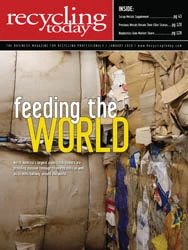CRI Looks at Costs, Results of Various Recycling Methods
The Container Recycling Institute (CRI), Culver City, Calif., has begun a study of the effects of single-stream collection of residential recyclables, with a particular focus on the economic and environmental impacts of this method on the material sent to consumers for remanufacturing.
In a press release, the CRI writes that the effects of various collection methods—source-separated curbside, commingled curbside, deposit/return—on the quality of materials recovered for recycling have not been formally researched and documented.
CRI has selected Clarissa Morawski, principal of CM Consulting, Toronto, to research the issue. Morawski is an expert on extended producer responsibility (EPR) and has authored reports on beverage container recovery systems.
For this study, Morawski reviewed 60 previously published studies, reports and articles in trade magazines.
According to the report, there are many negative downstream impacts of contaminated feedstock resulting from the mixing of materials through single-stream curbside collection, according to the CRI.
The report can be downloaded at www.container-recycling.org.

Explore the January 2010 Issue
Check out more from this issue and find your next story to read.
Latest from Recycling Today
- Nucor receives West Virginia funding assist
- Ferrous market ends 2024 in familiar rut
- Aqua Metals secures $1.5M loan, reports operational strides
- AF&PA urges veto of NY bill
- Aluminum Association includes recycling among 2025 policy priorities
- AISI applauds waterways spending bill
- Lux Research questions hydrogen’s transportation role
- Sonoco selling thermoformed, flexible packaging business to Toppan for $1.8B





